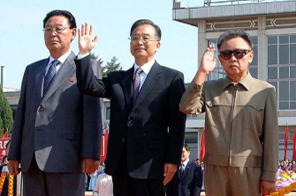China, NKorea pledge stronger ties
SEOUL: China and North Korea vowed Monday to strengthen a friendship which they said preserved regional peace, as Premier Wen Jiabao pressed on with a mission to bring Pyongyang back to nuclear disarmament talks.
"History has proven that developing China-North Korea relations is in line with the fundamental interests and common aspirations of the two peoples and conducive to safeguarding regional peace and stability," said a Chinese foreign ministry statement quoting its President Hu Jintao and Wen.
"We are willing to work together with North Korea to... constantly push forward friendly and cooperative relations."
The statement, issued to mark the 60th anniversary of diplomatic relations, came on the second day of Wen's high-profile visit to Pyongyang. It made no mention of the North's nuclear programmes.
In the same statement, the North's leader Kim Jong-Il was quoted as calling the bilateral relationship "a common treasure".
"Consolidating and developing this friendship is the consistent position of our party and government," it quoted Kim and other leaders as saying, adding the two countries had made "great contributions" to maintaining regional and world peace.
While Beijing is Pyongyang's sole major ally and its major trade partner and energy supplier, the North's determination to develop nuclear weapons has strained ties.
In April the North announced it was quitting six-nation disarmament talks hosted by China, and it staged its second nuclear test in May.
China supported tougher United Nations sanctions imposed following the test.
Kim Jong-Il personally hosted an elaborate red-carpet airport welcome for Wen Sunday.
But it was unclear whether the Chinese premier would be able to persuade the North to come back to the six-party forum, also including the United States, South Korea, Japan and Russia.
In Wen's talks Sunday with Premier Kim Yong-Il and other senior officials, the North again expressed willingness to achieve denuclearisation through "bilateral and multilateral dialogues", Pyongyang's state media reported.
The North, however, blamed the United States for the standoff and linked denuclearisation of the Korean peninsula to the pace of global atomic disarmament efforts.
Wen said "dialogue and consultation" is the only way to solve the Korean peninsula's nuclear issue, according to China's official Xinhua news agency.
Six-party deals which the North agreed in 2005 and 2007 refer only to nuclear disarmament on the Korean peninsula, not in the wider world. The United States withdrew atomic weaponry from South Korea in the early 1990s.
The North has lately been stressing its claim that it needs atomic weapons as a shield against US hostility. It also seeks formal recognition as a nuclear-armed state, something Washington and Seoul have adamantly rejected.
South Korea's Yonhap news agency said the Chinese premier is expected to hold talks later Monday with Kim Jong-Il. The agency has predicted Kim could make an "important announcement" during Wen's visit.
It said he was expected to state willingness to give up nuclear weapons and make detailed suggestions, while delivering his position on whether he wants six-party talks or a different type of dialogue.
The North is pressing for bilateral talks with the US to end the nuclear standoff. Washington says such talks are possible but only if the goal is to restart the six-party forum.
Wen is the most senior Chinese figure to visit the North since President Hu in 2005.
China has termed Wen's visit a "goodwill" trip to mark the anniversary of diplomatic relations, but nuclear issues are clearly high on the agenda.
He is accompanied on his three-day visit by Foreign Minister Yang Jiechi and Wu Dawei, China's envoy to the stalled six-nation talks.
On Monday Wen toured a cemetery for Chinese soldiers who died fighting for the North in the 1950-53 war, Xinhua reported.






